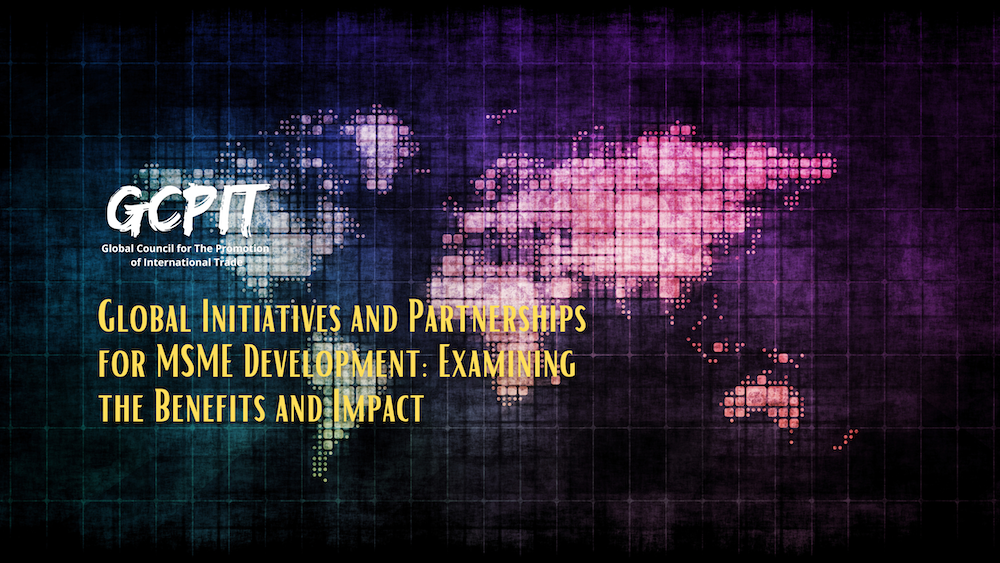
In recent years, there has been a growing recognition of the important role that micro, small, and medium-sized enterprises (MSMEs) play in driving economic growth and creating jobs. As a result, governments, multilateral organizations, and other stakeholders have implemented a range of policies, bilateral agreements, investments, and other initiatives to support the growth and competitiveness of MSMEs. These efforts have been particularly critical in the context of the COVID-19 pandemic, which has had a significant impact on MSMEs around the world. In this blog, we will examine recent policies, bilateral agreements, investments, and other initiatives aimed at boosting MSMEs, improving international trade, developing competencies, and investing in infrastructure to improve the competitiveness of MSMEs.
As of 2023, various policies, bilateral agreements, investments, and infrastructure developments have been initiated to boost the competitiveness and resilience of MSMEs globally. These initiatives aim to improve international trade, enhance digital finance, and develop competencies among MSMEs to adapt to changing economic conditions. The following is a detailed analysis of recent policies and initiatives in this regard:
Build Back Better World (B3W) initiative (2021)
This initiative is a global infrastructure development program announced by the United States in June 2021. The initiative aims to provide an alternative to China’s Belt and Road Initiative by promoting high-quality, transparent, and sustainable infrastructure investment in low- and middle-income countries. The B3W initiative focuses on four key areas of investment: climate, health, digital technology, and gender equity. The initiative is expected to mobilize significant private sector investment and contribute to job creation and economic growth in the participating countries.
The benefits of the B3W initiative are manifold. By promoting sustainable and transparent infrastructure investment, the initiative can help to combat corruption, promote good governance, and foster economic development in participating countries. Moreover, by focusing on key areas such as climate, health, and digital technology, the B3W initiative can help to address some of the most pressing global challenges of our time. This can include improving access to healthcare, reducing carbon emissions, and promoting technological innovation.
The impact of the B3W initiative on MSMEs can be significant. MSMEs are the backbone of many developing economies, and improving infrastructure and access to technology can help them to grow and thrive. By providing funding for infrastructure projects and promoting digital technology, the B3W initiative can help to create new markets for MSMEs, expand their reach, and increase their competitiveness. This can contribute to job creation, poverty reduction, and economic growth in participating countries.
Build Back Better World (B3W) initiative is an important global infrastructure development program that has the potential to contribute significantly to economic growth and job creation in participating countries. By promoting sustainable and transparent infrastructure investment in key areas such as climate, health, and digital technology, the initiative can help to address some of the most pressing global challenges of our time. Moreover, by focusing on MSMEs and improving their access to technology and markets, the B3W initiative can help to foster inclusive economic growth and development.
Comprehensive Agreement on Investment (CAI) (2021)
The European Union (EU) and China signed the Comprehensive Agreement on Investment (CAI) in December 2020, marking a significant milestone in the economic relationship between the two global powers. The CAI aims to improve market access and level the playing field for European companies in China, while providing Chinese investors with more opportunities in the EU market. The agreement has the potential to benefit both parties by promoting economic growth and creating jobs.
The CAI is expected to bring significant benefits to both the EU and China. For the EU, the agreement will provide greater access to the Chinese market, particularly in sectors such as automotive, financial services, and health care. European companies will also benefit from improved investment protection, including provisions for dispute resolution and greater transparency in regulatory decision-making.
For China, the CAI will provide increased access to the EU market, particularly in sectors such as renewable energy and environmental protection. The agreement will also promote greater transparency and predictability in the regulatory environment for Chinese investors in the EU.
The CAI has the potential to create significant economic growth and job creation in both the EU and China. By increasing market access and promoting investment, the agreement can facilitate greater trade and investment flows between the two parties. This will help to create new business opportunities and drive innovation in key sectors.
The CAI can also contribute to the broader goal of promoting a more open and integrated global economy. By promoting greater cooperation between the EU and China, the agreement can help to address some of the key challenges facing the global economy, such as climate change, energy security, and geopolitical tensions.
The Comprehensive Agreement on Investment between the EU and China marks an important milestone in the economic relationship between the two global powers. By improving market access and leveling the playing field for European companies in China, the agreement can create new business opportunities and drive innovation in key sectors. The agreement also has the potential to contribute to the broader goal of promoting a more open and integrated global economy.
Single African Air Transport Market (SAATM) (2018)
The Single African Air Transport Market (SAATM) is an initiative of the African Union aimed at promoting air transport liberalization and increasing intra-African air connectivity. The initiative was launched in January 2018 and seeks to open up African skies, reduce air transport costs, and stimulate economic growth on the continent.
The SAATM initiative is expected to bring significant benefits to African economies, especially for micro, small and medium-sized enterprises (MSMEs). The initiative will create a single unified air transport market, which will increase competition among airlines, reduce airfares and improve connectivity, making it easier and cheaper for businesses to transport goods and people across the continent.
The SAATM will also create new business opportunities for MSMEs in the aviation sector, such as airlines, airports, and ground handling services. This will lead to the creation of new jobs and the expansion of existing businesses, leading to economic growth and poverty reduction.
The SAATM initiative has the potential to significantly impact African economies by improving intra-African trade, investment, and tourism. According to the African Union, the SAATM could generate up to $1.3 billion in annual economic benefits for the continent and create up to 155,000 new jobs in the aviation sector alone by 2025. The initiative will also contribute to the realization of the African Continental Free Trade Area (AfCFTA) by promoting intra-African trade and increasing regional integration. The SAATM will facilitate the movement of people, goods, and services across the continent, reducing trade barriers and promoting economic growth.
SAATM is a critical initiative for promoting economic growth and development in Africa. The initiative has the potential to significantly impact African economies, increase connectivity and promote intra-African trade, investment, and tourism.
Trade and Technology Council (2021): It is a joint initiative between the United States and the European Union launched in 2021 to enhance collaboration and address common concerns in trade and technology. The TTC aims to promote innovation, address the digital divide, and strengthen the rules-based trading system.
The TTC provides a platform for the US and EU to collaborate on a range of issues related to trade and technology. This includes promoting open and transparent standards for emerging technologies, addressing market-distorting practices by third countries, and ensuring that trade policy is aligned with environmental and social goals.
The TTC also aims to enhance digital connectivity and infrastructure, supporting the development of emerging technologies and ensuring that they are accessible to all. By fostering innovation and creating a level playing field for businesses, the TTC can promote economic growth and job creation on both sides of the Atlantic.
The TTC has the potential to significantly impact the global economy by promoting fair and open trade in emerging technologies. By addressing concerns related to data protection, intellectual property rights, and cybersecurity, the TTC can help build trust and encourage innovation. The TTC can also support the development of small and medium-sized enterprises (SMEs) by providing them with greater access to global markets and supporting their participation in the digital economy. By promoting collaboration between the US and EU, the TTC can help SMEs to overcome the challenges of cross-border trade and expand their businesses.
Overall, the TTC represents a significant opportunity for the US and EU to work together to promote innovation, economic growth, and job creation. By aligning their trade policies and fostering greater collaboration in emerging technologies, the US and EU can ensure that they remain at the forefront of the global economy.
MSME Emergency Response Facility (2020)
The COVID-19 pandemic has had a significant impact on micro, small, and medium-sized enterprises (MSMEs) globally, disrupting their operations and threatening their survival. In response, the World Bank launched the MSME Emergency Response Facility in 2020 to provide financial support and technical assistance to MSMEs in developing countries affected by the pandemic.
The MSME Emergency Response Facility is a multi-donor trust fund that aims to address the urgent needs of MSMEs during the pandemic. It provides financial assistance to MSMEs through grants, loans, and guarantees, as well as technical assistance and training to help them adapt to the changing economic landscape.
The initiative aims to help MSMEs stay afloat during the pandemic, preserve jobs, and support economic recovery. By providing financial support to MSMEs, the initiative helps to maintain the integrity of supply chains, prevent business closures, and ensure that these enterprises can continue to contribute to economic growth.
In addition to providing financial support, the MSME Emergency Response Facility also aims to help MSMEs adapt to the new economic environment. This includes providing technical assistance and training on topics such as digital transformation, e-commerce, and financial management, which can help MSMEs increase their resilience and competitiveness in the long term.
The MSME Emergency Response Facility has already provided support to over 4.5 million MSMEs in more than 130 countries, demonstrating the significant impact that this initiative can have in supporting economic recovery and job creation during times of crisis. As the pandemic continues to affect MSMEs around the world, initiatives like the MSME Emergency Response Facility will play an important role in supporting these enterprises and promoting inclusive economic growth.
Enhanced Trade Partnership (ETP) (2021)
The United Kingdom (UK) and India have agreed to enhance their trade relationship with the Enhanced Trade Partnership (ETP), announced in May 2021. The agreement aims to reduce trade barriers, increase investment, and promote collaboration in key sectors such as food and drink, life sciences, and information technology. The ETP is expected to bring numerous benefits to both countries. For the UK, it presents an opportunity to expand its trade relations outside of the European Union (EU) and strengthen its position as a global trading partner. India, on the other hand, can benefit from increased market access to the UK, one of the world’s largest economies, and attract more foreign investment.
The agreement also includes a commitment to improve cooperation in areas such as intellectual property rights, regulatory cooperation, and environmental standards. This can promote a level playing field for businesses and encourage sustainable trade practices.
The ETP is expected to have a significant impact on economic growth and job creation in both countries. The UK’s Department for International Trade estimates that the agreement can increase trade between the two countries by £50 billion ($69 billion) over the next decade and create around 6,500 jobs in the UK.
For India, the agreement can boost exports to the UK by up to £1 billion ($1.4 billion) and create new job opportunities in key sectors such as IT and life sciences. It can also attract more foreign investment to India, particularly in the areas of infrastructure and manufacturing.
The Enhanced Trade Partnership between the UK and India represents a significant step forward in their trade relationship. By reducing trade barriers, increasing investment, and promoting collaboration in key sectors, the agreement can bring numerous benefits to both countries. It can also have a positive impact on economic growth and job creation, making it a crucial component of post-pandemic recovery efforts.
Africa Digital Finance Initiative (2019)
It was launched in 2019 by the African Development Bank (AfDB) in partnership with the Rockefeller Foundation and the government of Germany. The initiative aims to address the challenges faced by African countries in developing and scaling up digital financial systems, which can enhance financial inclusion and support economic growth.
ADFI supports African countries to develop sound policies, regulatory frameworks, and infrastructure needed to accelerate digital financial services. The initiative provides technical assistance and resources to African governments and central banks, fintech companies, and financial institutions to enable them to develop digital finance solutions that can improve access to financial services, reduce transaction costs and risks, and promote financial stability.
The benefits of the Africa Digital Finance Initiative are numerous. By promoting digital finance, ADFI can help to increase access to financial services for underserved populations, including rural communities, women, and small and medium-sized enterprises (SMEs). This can contribute to reducing poverty, creating jobs, and enhancing economic growth. The initiative can also promote financial inclusion by enabling individuals and businesses to access a range of financial services, including savings, credit, insurance, and payments.
ADFI can also contribute to building a more resilient financial sector in Africa. By promoting the development of digital financial infrastructure and services, the initiative can help to enhance financial stability, reduce the risk of financial exclusion, and increase financial resilience in the face of shocks such as natural disasters, pandemics, and economic downturns.
Overall, the Africa Digital Finance Initiative has the potential to contribute significantly to economic growth and development in Africa. By promoting digital finance and supporting the development of sound policies, regulatory frameworks, and infrastructure, ADFI can help to improve access to financial services, reduce poverty, and create jobs, while also building a more resilient and stable financial sector.
U.S.-Japan Competitiveness and Resilience Partnership (CRP) (2021)
It is a joint initiative launched in April 2021 by the United States and Japan. The partnership aims to enhance cooperation in a wide range of areas, including technology, supply chain resilience, and human resource development. The initiative is expected to promote economic growth, create new jobs, and strengthen the strategic partnership between the two countries.
The CRP has several potential benefits for both the United States and Japan. By promoting cooperation in technology, the partnership can help to spur innovation and enhance the competitiveness of both countries’ industries. The CRP also aims to promote supply chain resilience by supporting the diversification of supply chains and the development of new technologies to enhance resilience. Additionally, the initiative aims to support human resource development, including promoting education and training programs for workers to enhance their skills and prepare them for new jobs.
The impact of the CRP on both the United States and Japan is expected to be significant. The partnership can help to create new jobs in both countries, particularly in industries that are experiencing rapid technological change. The initiative can also help to enhance the competitiveness of U.S. and Japanese industries, promoting economic growth and prosperity. Additionally, the CRP can strengthen the strategic partnership between the United States and Japan, promoting peace and stability in the Asia-Pacific region.
The U.S.-Japan Competitiveness and Resilience Partnership (CRP) is a promising initiative that can have significant benefits for both countries. By promoting cooperation in technology, supply chain resilience, and human resource development, the CRP can enhance the competitiveness of U.S. and Japanese industries, promote economic growth and create new jobs. Additionally, the initiative can strengthen the strategic partnership between the United States and Japan, promoting peace and stability in the Asia-Pacific region.
European Green Deal (2019)
In 2019, the European Commission launched the European Green Deal, which is a comprehensive plan to tackle climate change and make Europe climate-neutral by 2050. The Green Deal aims to transform the EU into a modern, resource-efficient, and competitive economy that is sustainable and carbon-neutral. The plan includes ambitious measures to reduce greenhouse gas emissions, protect biodiversity, and promote circular economy principles.
The European Green Deal offers many benefits to the EU and its citizens. By reducing greenhouse gas emissions and promoting the use of renewable energy sources, the Green Deal will help mitigate the effects of climate change and improve air quality. This will lead to a healthier environment and reduce the negative impact of climate change on the EU’s economy and society. Additionally, the Green Deal will encourage innovation, create new jobs, and support economic growth.
The European Green Deal will have a significant impact on the EU’s economy and society. The plan aims to reduce greenhouse gas emissions by at least 55% by 2030, compared to 1990 levels. This will require significant investments in renewable energy sources, energy-efficient buildings and transport, and sustainable agriculture and forestry. The Green Deal will also promote the use of circular economy principles, such as recycling and reuse, to reduce waste and increase resource efficiency.
The implementation of the Green Deal is expected to create new job opportunities in sectors such as renewable energy, energy-efficient buildings, and sustainable agriculture. It will also support the growth of innovative companies that develop and implement sustainable technologies and solutions. However, the transition to a climate-neutral economy will require significant investments and changes in many sectors of the economy. Therefore, the Green Deal also includes measures to support workers and regions affected by the transition, such as the Just Transition Fund and the Platform for Coal Regions in Transition.
Overall, the European Green Deal is a comprehensive and ambitious plan to tackle climate change and make Europe a more sustainable and competitive economy. The plan offers many benefits, such as a healthier environment, new job opportunities, and economic growth, but it also requires significant investments and changes in many sectors of the economy.
SME Competitiveness Outlook (2021)
The SME Competitiveness Outlook is an annual report published by the International Trade Centre (ITC) that provides insight into the current state of small and medium-sized enterprises (SMEs) around the world. The report examines the challenges and opportunities faced by SMEs, and presents strategies and policy recommendations for governments and other stakeholders to support their growth and competitiveness.
The 2021 SME Competitiveness Outlook highlights the impact of the COVID-19 pandemic on SMEs, particularly in terms of their ability to access finance, adapt to digital technologies, and participate in global value chains. The report also emphasizes the importance of addressing gender gaps and promoting sustainable business practices in the SME sector.
One of the key benefits of the SME Competitiveness Outlook is that it provides policymakers and other stakeholders with data-driven insights and practical recommendations for supporting SMEs. By understanding the challenges faced by SMEs and implementing policies and programs to address these challenges, governments can promote economic growth, job creation, and innovation.
The impact of the SME Competitiveness Outlook can be seen in the policies and programs implemented by governments and other stakeholders to support SMEs. For example, the report has informed the development of initiatives such as the MSME Emergency Response Facility by the World Bank, which provides emergency support to SMEs affected by the COVID-19 pandemic. The report has also highlighted the importance of digitalization and e-commerce for SMEs, leading to the development of programs such as the Africa Digital Finance Initiative by the African Development Bank.
Overall, the SME Competitiveness Outlook plays an important role in promoting the growth and competitiveness of SMEs around the world. By providing data-driven insights and practical recommendations, the report informs the development of policies and programs that can support SMEs and contribute to economic growth and job creation.
The policies and initiatives mentioned above demonstrate the global commitment towards boosting MSMEs and promoting economic growth and job creation. The COVID-19 pandemic has further highlighted the importance of these efforts as MSMEs are often the backbone of local economies, but also among the hardest hit. The initiatives range from bilateral agreements, infrastructure investment, digital finance, and technology partnerships, to addressing the challenges faced by MSMEs during the pandemic. The benefits and impacts of these initiatives are expected to be significant, especially for MSMEs, as they are designed to provide support, resources, and opportunities for growth and development. The continued collaboration and cooperation among nations and organizations are essential to ensure the success of these initiatives and the resilience of the global economy. It is crucial to maintain the momentum and build on these efforts to create a more inclusive, sustainable, and prosperous future for all.
References
- “Build Back Better World (B3W) initiative.” The White House. https://www.whitehouse.gov/briefing-room/statements-releases/2021/06/12/fact-sheet-build-back-better-world-b3w-initiative/
- “EU-China Comprehensive Agreement on Investment.” European Commission. https://ec.europa.eu/commission/presscorner/detail/en/IP_20_2531
- “Single African Air Transport Market.” African Union. https://au.int/en/ti/saatm
- “U.S.-EU Joint Statement on Launch of the Trade and Technology Council.” U.S. Department of State. https://www.state.gov/u-s-eu-joint-statement-on-launch-of-the-trade-and-technology-council/
- “MSME Emergency Response Facility.” World Bank. https://www.worldbank.org/en/topic/msmes/brief/msme-emergency-response-facility
- “UK-India Enhanced Trade Partnership.” UK Government. https://www.gov.uk/government/news/uk-and-india-strike-new-agreement-to-deepen-economic-ties
- “Africa Digital Finance Initiative.” African Development Bank. https://www.afdb.org/en/blogs/africa-digital-finance-initiative
- “U.S.-Japan Competitiveness and Resilience Partnership.” U.S. Department of State. https://www.state.gov/u-s-japan-competitiveness-and-resilience-partnership/
- “European Green Deal.” European Commission. https://ec.europa.eu/info/strategy/priorities-2019-2024/european-green-deal_en
- “SME Competitiveness Outlook.” International Trade Centre. https://www.intracen.org/sme-competitiveness-outlook/








